

RAPSODY 29 similar search results:
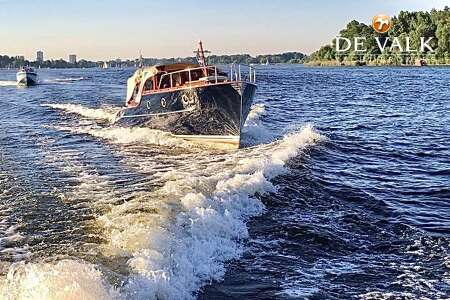
RAPSODY 29 OC-F
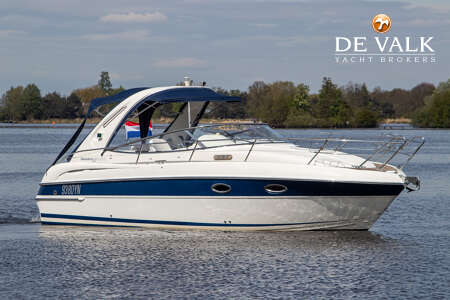
BAVARIA MOTOR BOATS 27 SPORT
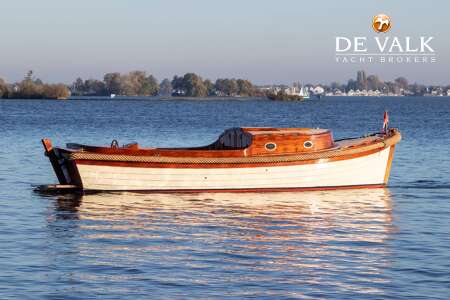
WESTER ENGH 790 CABIN
The rapsody 29 shown below has been sold:.

Sales information
- De Valk Loosdrecht The Netherlands
- +31 35 582 90 30
- Call the broker
e-mail the broker
Tell a friend.
- download brochure
Take time onboard with a live video tour
Seen a boat that piques your interest but can't make a visit in person? One of our brokers will be your eyes and ears as they take you on a video tour with their phone. You can also ask them questions about anything that isn't visually obvious. Make the call and be welcomed aboard...
Download brochure
Broker's comments.
Rapsody 29 with only 241 engine hours! Built in 2001 by Prins van Oranje - Heeg/NL. Spectucular Rapsody with a nice and large open cockpit to keep in close contact with the water. Nicely mahogany finished interior with 2 berths to sleep in the weekends. Must be seen!
| 8,45 x 2,45 x 0,65 (m) | ||
| grp | ||
| 2001 | ||
| 1 x Yanmar 4JH3-HTE diesel | ||
| 100,14 (hp), 73,6 (kw) |
| at sales office | ||
| De Valk Loosdrecht | ||
| sold | ||
General - RAPSODY 29
Rapsody 29, Name, Pennies from heaven, Yard, Prins van Oranje - Heeg/NL, Dimensions, 7,45 x 2,45 x 0,65 m, Headway, approx. 1,75 m, Hull material, epoxy with mahogany, Deck material, teak with mahogany, Superstructure material, epoxy with mahogany, Windows, hardened glass, Hull shape, roundbilged with deep-V, Hull colour, mahogany wood, Displacement, approx. 2,8 tonnes, Fuel tanks, approx. 120 litres, Water tank, approx. 150 litres, Holding tank, approx. 50 litres, Steering system, hydraulic.
Accommodation
Interior style, mahogany, Spacious cockpit with U-shaped settee and 2 seperate drivers seats, Mahogany helmposition, Headroom, approx. 1,50 m, Cabins, 1, Berths, 2, Toilet, 1 x electric, Stove, 1 x Electrolux burner on spiritus, Fridge, Vitrifrigo with freezich compartment, Stainless steel sink.
Engine, Yanmar 100 hp 4 cylinder turbo diesel engine, Engine type, 4JH3-HTE, Engine hours, 241, Cooling, via heat exchanger, Shaft drive, Bow thruster, Side Power SP35s, Batteries, 2 x 90 A/h Siemens, Battery charger with Mastervolt battery control panel, Shore power, 230V with cable. Electric circuit, 12V-230V.
Ritchie liquid compass, Simrad IS 15 LOG, VDO, rudder indicator, Engine controls.
Kenwood radio CD-player, Mahogany steering wheel, Mahogany flagstaff, Stainless steel details on deck, Stainless steel portholes, Fire extinguisher, Teakwood swimming platform, Stainless steel swim ladder, Sprayhood. and cockpit cover.

- Current affairs

Kazakh as an Unwritten Language: The Case of Astrakhan Oblast
- September 28, 2023
- 12 minute read

An ethnically diverse region that abuts the Caspian Sea in southwestern Russia, Astrakhan Oblast is home to the country’s largest Kazakh community. Almost 150,000 people, or 18 percent of the oblast’s population, identify as ethnic Kazakhs. Although Astrakhan does border Kazakhstan, most of them are not recent immigrants from the neighboring country. Their families have been living in what is now Astrakhan since long before the current national borders were drawn.
Dor Shabashewitz
Dor Shabashewitz is a Russia-born Israeli journalist and political analyst with a background in anthropology and sociolinguistics. He worked as a junior researcher at the RAS Institute for Linguistic Studies and conducted extensive fieldwork in Astrakhan’s Kazakh and Nogai rural communities as a part of his Master’s studies at the European University at St. Petersburg. In 2021, the Russian Federal Security Service forced him to leave the country following politically motivated accusations of “extremism” and “separatism.” These days, he covers ethnic minority rights and regional politics in the Lower Volga and Central Asia for RFE/RL ’s Tatar-Bashkir Service.
* The article that follows provides a brief overview of the sociolinguistic situation among those Kazakhs living in the Russian part of the Volga River delta. It is based on field research conducted by the author during his master’s studies between 2019 and 2021.
In the Middle Ages, Astrakhan was part of the Golden Horde and, later, an independent khanate. In 1556, it was conquered by the Russians and eventually incorporated into the Russian Empire as a governorate. The first major wave of Kazakh migration to Astrakhan Governorate began between 1799 and 1801, when Bökey Khan, son of the Junior jüz leader Nuraly, led several thousand nomadic families from across the Ural River to a more fertile area in the Volga River delta. A steady influx of Kazakh settlers continued well into the mid-nineteenth century. The new Astrakhan Kazakh community led by Bökey enjoyed the status of a semi-independent vassal state for several decades before gradually ceding most of its autonomy under pressure from the Russian authorities.
The early Soviet years revived the idea of a Kazakh autonomous area in Astrakhan. In 1919, some of the Kazakh districts of Astrakhan Governorate were grouped together under the name Volga-Caspian Kirghizia and transferred to what later became the Kazakh SSR. Most of them stayed and became part of Kazakhstan upon its independence, but some of the transfers were reversed in the 1920s. Thus, the Volodarsky and Krasny Yar districts ended up in Russia’s Astrakhan Oblast despite 70 percent and 50 percent of their inhabitants, respectively, being ethnic Kazakhs.
Notwithstanding the omnipresent linguistic Russification of the Soviet era, Kazakh enjoyed certain formal privileges in the Kazakh SSR as a co-official language that was used in many schools, especially in rural areas. State-funded magazines, newspapers, books, and movies were produced in the language. Government support for the national language and its social prestige only increased after Kazakhstan became a sovereign country in 1991. This was not the case in Astrakhan Oblast—the region’s Kazakh community had no linguistic autonomy or representation under the Soviets, and this did not change when the USSR fell apart.
Vitality Factors
In what state, then, is the Kazakh language among Astrakhan’s Kazakhs after decades without formal recognition? In what domains is it still spoken? What do the Astrakhan Kazakhs think of their ethnic language, and what role does it play in their identity? These were the questions I hoped to answer when I set off on a fieldwork trip to my home region’s Volodarsky district as a master’s student in social anthropology back in 2019.
During my fieldwork, I visited numerous rural settlements of varying sizes, ethnic compositions, locations, histories, and economic conditions. It became evident that all of these factors played a significant role in the vitality of Kazakh in any given village, but the relative weight of each factor was rather unexpected. My analysis showed that the share of ethnic Kazakhs in a village did not correlate strongly with how much they used the language in their daily lives. I have been to monoethnic Kazakh villages that spoke almost exclusively Russian, as well as mixed ones where Kazakh was still maintained by some members of the younger generations.
Geography and the perceived history of a settlement turned out to be the two most defining factors. Inhabitants of villages that are close to Astrakhan City and have a stable public transport connection to the city tend to switch to Russian more quickly than residents of more remote ones. Career opportunities in rural areas are scarce, prompting villagers to look for jobs in the urban center. When logistically possible, many opt to continue living in their villages and commute to work several times a week instead of moving to the city. Despite its impressive ethnic diversity, Astrakhan City is overwhelmingly Russian-speaking. Kazakh rural commuters tend to integrate into this environment and “bring it home” after work, influencing the linguistic landscape of their communities.
“Perceived history” deserves an anthropological study of its own. Many of the Astrakhan Kazakhs I interviewed explained that their villages were originally founded by Russian peasants or created by the Soviets in a centralized way and populated by collective farm workers of diverse origins. Many settlements with such histories gradually became majority-Kazakh, but most locals believed they were “not really Kazakh villages” and thus considered Kazakh a rather inappropriate language to use in public spaces. In settlements such as Vinny, this mentality led to Kazakh becoming a family language only, with Russian as the sole means of communication in all other domains—even between Kazakhs.
This stands in stark contrast to the village of Altynzhar, which was founded by Kazakh settlers and has a long tradition of local pride. The renowned nineteenth-century Kazakh composer Qurmangazy is buried in Altynzhar; the village hosts a museum dedicated to his life and to the culture of the region’s Kazakh community more generally. Altynzhar was also home to the Kazakh poet and language activist Mäjilis Ötejanov. Due to its history and cultural significance, Altynzhar is often viewed as the informal capital of the Astrakhan Kazakhs. This status, combined with the lack of reliable public transportation, helps the local population to maintain their language and identity better than elsewhere.
Language Use
Despite the differences between individual settlements, home is by far the most common domain of use for the Kazakh language across Astrakhan Oblast. For most of my respondents, constant code-switching between Russian and Kazakh is the default register when they talk to their relatives. The ratio of elements from the two languages, however, varies widely. Kazakh may dominate or it may only be represented by several words—but, as my experience shows, it is never fully absent.
In Vinny, I interviewed a young Kazakh man who was born and raised in the village but went to an urban high school and later moved to a different part of Russia for university. These days, he lives and works in Astrakhan City. At the time I met him, he was visiting Vinny to see his parents, who still lived there permanently. During the interview, he said he spoke no Kazakh at all: “I do not speak Kazakh… Never wanted to learn it, thought it was useless. Grandma would talk to me in Kazakh, and I am like… I do not understand everything, but I can get the general idea.”
Just an hour later, I overheard him using numerous Kazakh words in a Russian-language conversation with his mother. Answering my ensuing question, the young man explained: “There are still some words that are easier for me to say in Kazakh. Like ‘scoop’ or ‘ladle’—I just say ojaw .” Later, I discovered other Kazakh words in the speech register he used at home. They were terms related to farming, as well as the names of certain traditional foods and houseware items.
This case is by no means unique—in fact, it is very typical. Lexical domains related to rural ways of life and things you find in a traditional household seem to be the least likely to be forgotten by young and predominantly Russian-speaking Astrakhan Kazakhs. This may be because they lack any similar rural experience gained in a non-Kazakh context.
Leaving the “Kazakh” village for the “Russian” city, one practically replaces one’s entire vocabulary—but with exceptions. The array of subjects discussed in urban settings is at least as wide as that in rural areas, but the two sets of lexical domains do not always coincide. Traditional ethnic cuisine, cattle farming, agriculture, and culturally specific rural household items are not things that city dwellers usually speak of, hence the words for them are not as easily replaced with Russian equivalents in the speech of first-generation urbanites. Sometimes, the Kazakh words remain the only ones they know. The lack of need or even opportunity to talk about these things in Russian makes this set of Kazakh vocabulary more resistant to attrition. It is only natural for urban Kazakhs to use these terms when they go to a rural area to visit their family. This may be viewed as a “light version” of cue-dependent language retrieval .
Equally, even among those Astrakhan Kazakhs who live in rural settlements and use Kazakh-Russian code-mixing as their default home register, one can point to specific domains that almost universally trigger the use of a much higher share of Russian-language elements. This includes all of the “complicated” domains, as the respondents call them. For example, a middle-aged man from the village of Novy Rychan said: “When fixing a TV set, we are most definitely talking in Russian.” In a different settlement, I witnessed four men talking in almost “pure” Kazakh—that is, using few Russian elements. Then one of them mentioned the COVID-19 pandemic, and this change of subject, combined with “complex” vocabulary related to healthcare and government policies, triggered an instant switch to almost equally “pure” Russian.
As is evident from these situations, Kazakh is often regarded and used as a rural and “simplistic” language, fitting for discussions of farming but not technology or anything modern. This set of associations speaks to its low social prestige—but may also be viewed positively by some. Many heritage speakers of Astrakhan Kazakh associate the language with a sense of home and strong family ties. “Kazakh is… It is something about your home, you know, where you feel most comfortable and secure. It is the mother language, after all. Whenever I hear it, I think of those evenings I spent in the village of Multanovo with my parents and grandma as a kid. I miss this feeling now that I live in the city,” said one of my respondents.
Two other important domains associated with Kazakh, which are intertwined with each other, are religion and ethnic celebrations. While overwhelmingly secular in daily life, most Astrakhan Kazakhs identify as Muslim. Many hardly ever go to mosques—in fact, there are large, exclusively Kazakh villages with no mosques at all. Moreover, the minority that does adhere to a strictly Islamic way of life is viewed as odd and even suspicious by the more secular majority.
Still, events such as weddings and funerals almost universally have an Islamic element to them. Interestingly enough, many of my respondents think of Islam as inseparable from the Kazakh language. “When the Quran is being recited, you are supposed to talk in Kazakh,” said a middle-aged man from Novy Rychan. Obviously, the recitation itself happens in Arabic, and one is supposed to listen to it rather than talk simultaneously. What this respondent meant was that the “religious” and “traditional” atmosphere of such events triggered increased use of Kazakh before and after the recitation and other rituals.
Kazakh as an Unwritten Language
While still widely spoken in some of the more remote villages, Astrakhan Kazakh remains a practically unwritten language. In the early Soviet years, Kazakh was used at numerous village schools as the primary language of instruction, but it was quickly downgraded to being taught as a subject only. By 1966, it had disappeared from the region’s school system entirely.
The perestroika era brought a surge in ethnic activism, with Kazakh language lessons being reintroduced in almost a hundred village schools in the late 1980s and 1990s. Unfortunately, this did not last long: Vladimir Putin’s rule brought another wave of linguistic Russification as part of his “unity through uniformity” policy. Kazakh was soon downgraded to an optional, once-a-week class. Today, fewer than 20 Astrakhan Oblast schools offer it in any form, even though over 140 of the region’s rural localities have a Kazakh majority or plurality.
This lack of Kazakh at school has resulted in entire generations having little exposure to written Kazakh and being functionally illiterate in it, even when perfectly literate in Russian. This can be seen from the way the names of many Astrakhan Kazakhs are written in their Russian IDs and passports. When giving their children legal names, many parents opt for naive phonetic approximations that do not match the way a name is normally spelled in Kazakhstan (eg., Kuvanshkirey rather than the more typical Qwanışkereý in Kazakh or Kuanyshkerey in Russian). Many of my respondents said they had trouble understanding and distinguishing the “weird letters” used in Standard Kazakh, referring to the additional and modified Cyrillic characters that are absent from the Russian alphabet.
Russian dominates all of the “formal” domains in Astrakhan Oblast, from education to technology and interactions with the government
Lack of language-specific literacy is not the only linguistic barrier between Kazakh-speakers in Astrakhan and those in Kazakhstan. As explained above, Russian dominates all of the “formal” domains in Astrakhan Oblast, from education to technology and interactions with the government. This means that most Astrakhan Kazakhs never discuss these topics in Kazakh and may be unfamiliar with the more “complex” vocabulary in that language, even when fully proficient in the registers related to home, family, traditions, and rural lifestyle.
“The Kazakh word for ‘proof’ is dälel , which I only know because I looked it up. My neighbor grew up speaking Kazakh, but she would not understand me if I used it when talking to her. She just uses the Russian word, dokazatelstvo ,” said a respondent from Multanovo. This is a perfect example of a term perceived as “complex” and thus unknown to many Astrakhan Kazakhs.
Most Astrakhan Kazakhs are well aware of the differences between their ethnic language and the Kazakh of Kazakhstan. A middle-aged, native Kazakh-speaking respondent from Novy Rychan talked about his trip to Atyrau, Kazakhstan, saying that he felt insecure about his Kazakh skills while there. He opted to talk to locals in Russian because he feared they would mock his “incorrect” Kazakh. This perception of Astrakhan Kazakh as “simplified” and “Russified” is fairly common among its speakers. While somewhat negative, it may also serve as a marker of the community’s identity, helping to distinguish between “us” (Astrakhan Kazakhs) and “them” (Kazakhstan Kazakhs).
Future of Kazakh in Astrakhan
The case of an Astrakhan Kazakh person looking up and memorizing a “complex” word associated with the Kazakh language of Kazakhstan illustrates a small but important tendency. A growing number of young, native Russian-speaking Astrakhan Kazakhs are deliberately immersing themselves in Kazakhstani media, explaining that they want to learn the “proper” way to speak their language and reconnect with their culture, which has been partially lost to colonization and assimilation.
While most young Astrakhan Kazakhs seem to have no interest in using their ethnic language in any form, this minority tendency offers hope that Kazakh will live on in Astrakhan Oblast. If the language policy does not change in the decades to come, the local dialect may eventually die out as a natural form of communication in rural communities, but Standard Kazakh is likely to be maintained by the conscious activist minority.
That being said, the continuity of the language policy is a big “if.” Russia’s government has been increasingly unstable since the beginning of the war in Ukraine. In many regions, ethnic minorities feel that they are unfairly overrepresented among those sent to fight in Ukraine, and this is especially true for Astrakhan Kazakhs. At the same time, the federal government is cracking down on indigenous activism more heavily than ever.
The growing dissent among minorities has led to the emergence of numerous secessionist organizations. An overview of pro-independence movements that view Astrakhan as a part of their hypothetical states can be found in my recent article for New Eastern Europe . It is hard to make predictions about the success of these movements, but in the event that they succeed, language policy and power dynamics between the region’s ethnic groups are more than likely to change.
All photos by
Dor Shabashewitz and Valery Maslov

Decorative and Funerary Art of Eurasia. An interview with Petya Andreeva
- August 23, 2023

A Brief History of Collecting Abr Clothing from Uzbekistan
- October 23, 2023
Subscribe now to our newsletter
You May Also Like


Solidarity: A Love Letter to Diasporic Asians in Russia, Central Asia, and Beyond
- May 11, 2023

What Can Golden Horde Fabrics Tell Us About Histories of Kazakhstan and Ukraine?
- September 23, 2022

Women, Kinship, and Property in Central Asia
- June 16, 2022

Rural Women in Kyrgyzstan: “Ayalzattyn tagdyry: mezgil kүүsүndө” (Women’s Fates Don’t Choose Times). An Interview with Cholpon Koichumanova
- May 6, 2022

Political Vagabonds of the Steppe and Their Influence on Modern Eurasia. A Conversation About Qazaqlïq With Joo-Yup Lee
- January 12, 2022

Social Mobilization in the Absence of Infrastructure and Services on the Urban Margins: Toward “Societal Infrastructures”
- November 15, 2021

How the Soviet State’s Promises of Water Were First Fulfilled and then Failed
- October 19, 2021

“Fruit from the Sands: The Silk Road Origins of the Foods We Eat”. An Interview with Robert Spengler
- August 18, 2021
Input your search keywords and press Enter.
- R35 V-Foil®
- Rapsody Instagram
- Rapsody Facebook
- Rapsody Youtube
Welcome to Rapsody
Everything we do, we do to amaze, we go the extra mile for little things that make the biggest difference. envisioned, designed and built in the netherlands each rapsody delivers a unique experience in waters all across the world..
Our craft equals our service, and our service is our signature. Whether you are an owner, partner or supplier, with us, you only have to introduce yourself once.
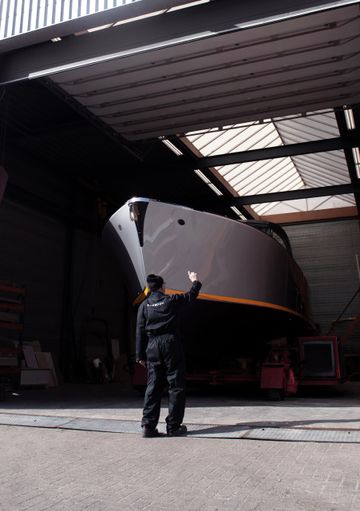
Craft by nature
Our yachts are handcrafted and build on our own shipyard in Makkum, The Netherlands. Our love for details is reflected by high quality finishes and technical installations you can trust. Craft is part of our DNA and characterised in our every move.

Dutch courtesy
Rapsody is a fully Dutch owned company and here, we like to keep things real. Being trustworthy means being transparent, honest and clear. Our Dutch courtesy is reflected in our every way.

Forward driven
We are spirited entrepreneurs, forward driven to make every experience amazing. Our curiosity makes us wonder what is possible, inspires ideas, stimulates improvements and drives progress.

Inside Rapsody 02 - At the shipyard
‘Every yacht we deliver makes me proud. Especially when we take it to the waters, it gives me the shivers.’ Marko van Enkhuizen Partner Rapsody Yachts
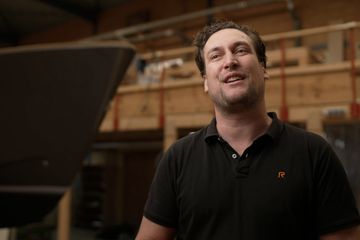
Inside Rapsody 05 - At the shipyard
‘And yes, that does make you proud of what we are doing here.’ Diederik van Golen Sales Director Rapsody Yachts
Rapsody stories

Rapsody Yachts Introduces: V-FOIL® TECHNOLOGY

The V is coming

Rapsody Yachts wins prestigious FWA design award.

Rapsody R38 Premieres at Hiswa Boat Show

Rapsody Yachts introduces the all new R38

IMAGES
VIDEO
COMMENTS
Typ von Rapsody. Finden Sie 11 Rapsody zu verkaufen in Ihrer Nähe, sowohl gebraucht als auch neu, Bootspreise, Fotos und Vieles mehr. Suchen Sie Bootshändler und finden Sie Ihr Boot bei YachtWorld.
At present, Rapsody, a yacht manufacturer has 11 yachts available for purchase on YachtWorld. This collection encompasses 5 newly built vessels as well as 6 pre-owned yachts, with all listings, handled by boat and yacht brokers, primarily concentrated in Netherlands, Germany and France.
Yachts that never cease to amaze. Our forward driven spirit, Dutch courtesy and signature service navigates the craft that's in our nature.
Rapsody kaufen - neue & gebrauchte Rapsody günstig und in großer Auswahl bei Boot24. Egal ob Rapsody gebraucht oder neu.
rapsody kaufen. 28 Boote. Testberichte und Artikel. 1 von 2 Seiten.
Finden Sie 27 Rapsody motorboote zum Verkauf auf Boatshop24, Europas größtem Marktplatz für Boote & Yachten. Wir verbinden jedes Jahr über 10 Millionen Bootskäufer und -verkäufer!
Bilder und sämtliche Details ansehen eines 2024 von Rapsody R38 gefertigten zum Verkauf stehenden Express-Boot.
Broker's comments. Delivered in August 2020 with a powerful 340 hp Volvo Penta engine, the Rapsody R32 offers a luxurious and stylish cruising experience. With a teak deck, convertible tent, sun bed, Fusion sound system and recent addition of a chartplotter with autopilot, this vessel embodies speed and comfort in perfect harmony.
The Rapsody R32; the weekender that exceeds all expectations. Rapsody Yachts, home for timeless yachting since '99.
Find Rapsody boats for sale in Netherlands. Offering the best selection of Rapsody boats to choose from.
Rapsody 29. Boot kaufen Finden Sie Ihr nächstes Boot auf der digitalen Bootsbörse für Motor- und Segelboote. Angebote aus Deutschland und Europa Gebrauchtboote Neuboote .
RAPSODY 29 for sale | Built by: RAPSODY YACHTS | Built: 2001 | Dimensions: 8,45x2,45x0,65m | Material: GRP | 1x Yanmar 4JH3-HTE diesel
Introducing the Rapsody R38 - a classic lined fast motor yacht, highly seaworthy with a deep V-hull for safe and comfortable passages in open water. She embodies the essence of elegance, power and flair.
Find Rapsody 29. boats for sale in your area & across the world on YachtWorld. Offering the best selection of rapsody boats to choose from.
Rapsody Currently, Rapsody, a yacht builder has 5 yachts available for purchase on YachtWorld. This collection encompasses 0 newly built vessels and 5 pre-owned yachts, with all listings handled by yacht brokers, primarily concentrated in Germany, France and Netherlands.
The Rapsody Tender is the ultimate get-away for all waters. Discover the all new Tender Hybrid. The perfect blend of style and speed
Rapsody 33. Boot kaufen Finden Sie Ihr nächstes Boot auf der digitalen Bootsbörse für Motor- und Segelboote. Angebote aus Deutschland und Europa Gebrauchtboote Neuboote .
Astrakhan Oblast ( Russian: Астраха́нская о́бласть, romanized : Astrakhanskaya oblastʹ; Kazakh: Астрахан облысы, romanized : Astrahan oblysy) is a federal subject of Russia (an oblast) located in southern Russia. Its administrative center is the city of Astrakhan. As of the 2010 Census, its population was ...
An ethnically diverse region that abuts the Caspian Sea in southwestern Russia, Astrakhan Oblast is home to the country's largest Kazakh community. Almost 150,000 people, or 18 percent of the oblast's population, identify as ethnic Kazakhs. Although Astrakhan does border Kazakhstan, most of them are not recent immigrants from the ...
For over two decades now, Rapsody has been building signature yachts. Handcrafted and built in our shipyard in Makkum the Netherlands, the attention to detail is felt in every way. From the first thing you'll see, to the seakeeping abilities of your yacht; "everything we do, we do to amaze." This is the core idea … Continued
The position was introduced in 1991 as Head of Administration of Astrakhan Oblast. The Governor is elected by direct popular vote for a term of five years.
Rapsody is a fully Dutch owned company and here, we like to keep things real. Being trustworthy means being transparent, honest and clear. Our Dutch courtesy is reflected in our every way. We are spirited entrepreneurs, forward driven to make every experience amazing. Our curiosity makes us wonder what is possible, inspires ideas, stimulates ...